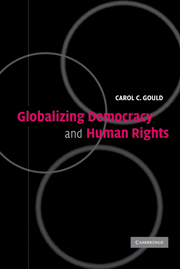Book contents
- Frontmatter
- Contents
- Acknowledgments
- Introduction: Between the Personal and the Global
- PART I THEORETICAL CONSIDERATIONS
- PART II DEMOCRACY AND RIGHTS, PERSONALIZED AND PLURALIZED
- PART III GLOBALIZING DEMOCRACY IN A HUMAN RIGHTS FRAMEWORK
- PART IV CURRENT APPLICATIONS
- 10 Democratic Management and the Stakeholder Idea
- 11 Democratic Networks: Technological and Political
- 12 Terrorism, Empathy, and Democracy
- Index
12 - Terrorism, Empathy, and Democracy
Published online by Cambridge University Press: 23 November 2009
- Frontmatter
- Contents
- Acknowledgments
- Introduction: Between the Personal and the Global
- PART I THEORETICAL CONSIDERATIONS
- PART II DEMOCRACY AND RIGHTS, PERSONALIZED AND PLURALIZED
- PART III GLOBALIZING DEMOCRACY IN A HUMAN RIGHTS FRAMEWORK
- PART IV CURRENT APPLICATIONS
- 10 Democratic Management and the Stakeholder Idea
- 11 Democratic Networks: Technological and Political
- 12 Terrorism, Empathy, and Democracy
- Index
Summary
In this final chapter, I want to focus on a key issue for international ethics: the normative understanding of terrorism, which has become increasingly global in its character and impact. More specifically, I consider the relation between terrorism and the concept of empathy, particularly as it emerges from feminist theory and as I have discussed it earlier in this work, and I also place this analysis in the context of the preceding discussion of democracy. I suggest that there is a close connection between the concepts of empathy and democracy, and I make some remarks about the relation of these to both terrorism and the possible responses to it.
Defining Terrorism
To concretize the discussion that follows, it is helpful to begin with a brief review of some definitions of terrorism, a widely used but rather muddy concept. The numerous definitions in the literature seem only to agree that terrorism involves violence or the threat of violence. Beyond that, there are important disagreements as to whether it is limited to the targeting of people who are noncombatants or also extends to combatants, whether it should be limited to violence perpetrated by nonstate actors or also encompass state terrorism, and whether we need to make reference to its purposes as part of the definition.
According to Michael Walzer, “Terrorism is the deliberate killing of innocent people, at random, in order to spread fear through a whole population and force the hand of its political leaders.”
- Type
- Chapter
- Information
- Globalizing Democracy and Human Rights , pp. 247 - 264Publisher: Cambridge University PressPrint publication year: 2004



